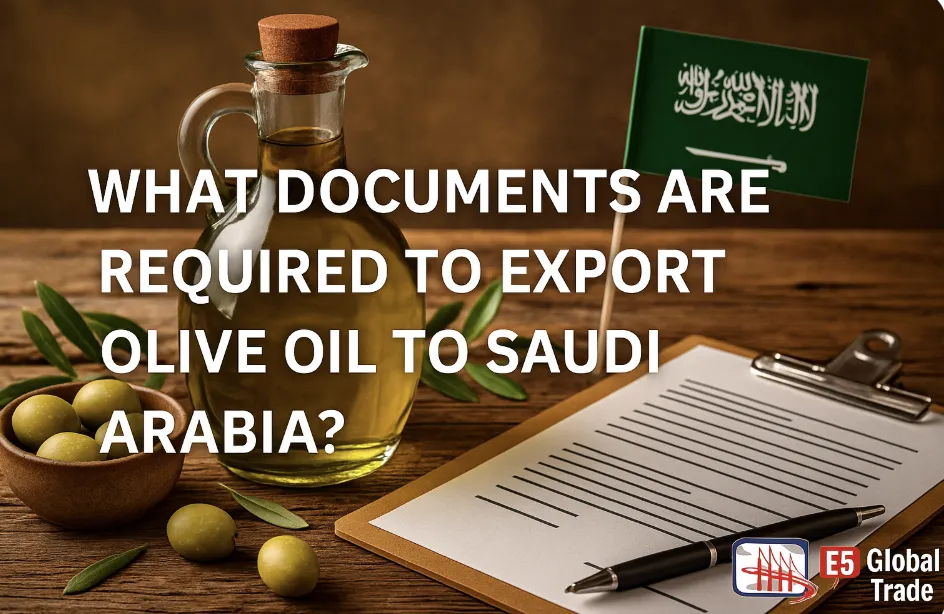What are the Required Documents for Olive Oil Exports to Saudi Arabia? Turkey has become a major player in olive oil exports to Saudi Arabia in recent years. Demand increases, especially during Ramadan and the Hajj periods, and local retailers and wholesalers seek quality and affordable products. However, product quality alone is not sufficient for exporting to Saudi Arabia. Certain documents and certificates are required to clear customs and enter the market. In this guide, we will explain step-by-step all the necessary documents, processes, and how to reach buyers through the platform for producers and exporters who want to export olive oil from Turkey to Saudi Arabia. 1. Certificate of Origin The certificate of origin officially proves that the product was produced in Turkey. This document is always required during the customs process. It is issued by the Chamber of Commerce or the Ministry of Commerce. Since an Arabic translation may be required, it is recommended that a translated version be prepared. 2. Halal Certificate: Because Saudi Arabia is a predominantly Muslim country, all food products must be Halal certified. The certificate must be issued by the Turkish Standards Institution (TSE), the Food and Beverage Administration, or an internationally recognized institution (e.g., GAC, MUI). The certificate must clearly state the product name, batch number, and production facility. 3. SASO Certificate and SABER System: SASO (Saudi Standards, Metrology and Quality Organization), Saudi Arabia's standards body, implements the SABER conformity assessment system for all imported products. This system includes: Product Certificate (PC): Obtained by submitting technical documentation, test reports, and certificates. Shipment Conformity Certificate (SCC): Generated through the SABER system for each shipment. The exporter must complete these procedures with the Saudi importer or through an authorized representative. 4. Health Report and Phytosantr Certificate: The health report proves that the product does not contain substances harmful to human health and that it was produced in accordance with food safety regulations. It is issued by the Ministry of Agriculture and Forestry. Additionally, if wood is used in packaging, a phytocenter certificate is required. 5. Commercial Invoice and Packing List The commercial invoice is one of the basic documents for export. It must include the following information: Exporter and importer information Product description (for example: Extra Citrus Olive Oil, 5L PET Bottle) Quantity, unit price, total amount Delivery method (such as FOB, CIF) The packing list must include details such as the number of packages, net/gross weight, batch number. 6. Labeling Requirements It is mandatory for all food products to be sold in Saudi Arabia to have an Arabic label on the packaging. The information that must be included on the label is as follows: Product name Net weight List of ingredients Expiration date (Hijri and Gregorian calendar) Manufacturer and importer information Halal logo Storage conditions Labels must be permanent, legible, and placed on the front of the product. 7. Laboratory Test Reports: Saudi authorities may request the following test reports to verify product quality: Acidity, Peroxide value, Fatty acid composition, Residues (heavy metals, pesticides). Reports must be issued by ISO/IEC 17025-accredited laboratories. How to Connect with Saudi Buyers? Connecting with the right buyer is the most critical stage of the export process. This is where a B2B marketplace like E5 Global Trade offers a significant advantage: Thanks to automatic ad publishing in 12 languages, your ad reaches Saudi buyers directly in Arabic. You can communicate in Arabic, English, or Turkish with multilingual instant messaging. You can respond directly to quotation requests from Saudi buyers through the RFQ (Request for Quotation) system. Gold and Silver packages and the VIP label offer a unique advantage and unlimited communication. Conclusion: Olive oil exports to Saudi Arabia have high earning potential, especially when supported by the right documentation. However, the key to success is fully meeting requirements such as SASO/SABER, Halal, certificate of origin, and Arabic labeling. The E5 Global Trade platform ensures you're not alone in this process. Equipped with advanced features, its SEO-compatible and mobile-friendly structure allows manufacturers and exporters to connect with international buyers quickly and securely.
E5 Global Trade | Yazılar
"What are the documents required to export olive oil to Saudi Arabia?"
Küresel Haber Ajansı
·


